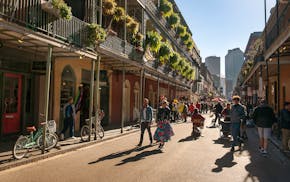After three days of budget revisions and a whopping 74 amendments, the Minneapolis City Council approved a property tax levy increase of 6.8% — the largest since 2010 — to fund the city budget next year.
Council members worked late into the night Tuesday as they scaled back Mayor Jacob Frey's original proposed levy increase of 8.1%, largely fueled by inflation, plummeting downtown property values, higher city employee salaries, millions in mandated police reforms and the end of federal pandemic funds. In August, Frey proposed a $1.9 billion budget.
The exact impact of the 6.8% levy increase on property tax bills wasn't available Tuesday night, but a 7% increase would have resulted in an additional $170, or 9.5%, in city taxes for the owner of a median value $331,000 home, according to the city assessor's office.
"A budget is a reflection of values — the Mayor's proposed budget valued bloated bureaucracy and high property taxes, the Council stepped in to reflect the values and needs of our residents — decreased property taxes and funded programs that impact their everyday lives," Council Vice President Aisha Chughtai, who chairs the Budget Committee, said in a statement after midnight.
Frey released a statement late Tuesday saying he would review the "unprecedented" number of council amendments over the next day and make a decision on whether to sign it. He said the council's budget proposal sets the city up for paying increased property taxes down the road, and cuts homelessness response and police recruitment to fund "pet projects."
"Financial times are tight and when federal funding is likely to be withheld and state dollars are in short supply, we need to be responsible with our tax dollars," Frey said.
Of the 39 people who testified at the final budget public hearing Tuesday night, only a handful complained about their taxes going up. One of them was Maren Macosko, a teacher who said her East Lake Street music venue's property taxes were going up 33% and her home's taxes were going up nearly 18%.
The levy is the total amount of money raised through property taxes. Changes to individual tax bills, which also include taxes raised by the school district, county and other taxing bodies, will vary.
Although the final vote on the levy was 12-1, with only Council Member Linea Palmisano voting "no," many of the budget amendments over the past three days were approved by the council's more progressive majority over the sometimes heated objections of other members more aligned with Frey. Council Member Andrea Jenkins, expressed frustration at "all of these new programs and new spending."
"Our taxpayers are feeling completely over-burdened," Jenkins said.
No raises for high-paid city employees
The council rejected raises for one group of employees, voting against giving 4% cost-of-living raises to 161 appointed city employees (typically directors) that are among the city's highest-paid workers. The council voted 7-5 against the raises, saving $1.1 million.
Palmisano called the decision to deny raises to just one group of employees "just plain wrong" and suggested "If we do this, maybe we need to take a look at our own salaries." The 13 Minneapolis council members are paid $109,846 annually. Council Member Katie Cashman said denying raises is better than cutting jobs.
Beefing up public safety in certain neighborhoods
Most of the budget revisions moved money around to fund programs the council wants or to beef up public safety in certain areas of the city. The council directed the Neighborhood Safety Department to do safety initiatives in the neighborhoods of Hiawatha, Whittier, Longfellow and Midtown Phillips. Palmisano likened them to pork-barrel projects rather than a data-driven public safety strategy, saying, "This should not be a free-for-all for people to grab things for their neighborhoods."
Chief Operations Officer Margaret Anderson Kelliher said Frey was concerned such earmarks would chip away at the city's overall public safety strategy.
Earmarks for nonprofits
The final batch of amendments approved Tuesday night included many directed to specific nonprofits and projects, including the Latino Center for Community Engagement, Mercado Central economic development project, One Southside Clinic project and Mni Sota Fund Indigenous Wealth Building Center.
"I object to how we're picking winners and losers here tonight," Palmisano said. "I've never seen something like this before."
Vetaw said the entities should have to go through a competitive process to get funding.
"It's favoritism," she said.
Supporters countered that they were funding worthy endeavors sought by their constituents.
The council also:
- Delayed the spending of $5.4 million for a technology improvement plan.
- Decreased the police budget for mounted patrols and directed the savings to fund a crime prevention specialist position in the 5th Precinct and additional needle pickup in the Hiawatha Neighborhood. Palmisano noted previous councils have tried to cut funding for the program, but the horses remain.
- Decreased the police chief's budget by about $631,000 and used the money to fund five civilian investigators, who handle non-violent and cases to free up police officers for more serious cases.
- Allocated $500,000 in unused public safety funds budgeted last year for community safety pilots to divert more 911 calls from police.
- Moved Canopy Roots' $5.9 million contract for behavioral crisis response work from the Neighborhood Safety Department to the Fire Department, reasoning that the Neighborhood Safety Department is about violence interruption and has had difficulty paying vendors. The council also moved $945,000 from the Neighborhood Safety Department to the Fire Department to increase the contract.
- Moved $500,000 from the Public Works Department budget for pedestrian street lighting in the Dinkytown and Marcy Holmes neighborhoods, where there have been high-profile assaults.
- Budgeted $1.8 million to cover housing and wraparound services for 50 unsheltered families and 50 individuals.
- Budgeted $1.6 million to help fund Avivo Village, an indoor grouping of "tiny houses" for homeless people in the North Loop.
- Moved $98,000 to begin planning a Safe Parking pilot program that allows people living out of vehicles to park in authorized spaces and have access to bathrooms, showers, Wi-Fi and supportive housing services.
- Allocated $150,000 for a street food vendor entrepreneur grant and compliance program.

Minnesotans find beautiful views, food and fun on trip to New Orleans via train

Fake texts are targeting Minnesota drivers for tickets. Here's what to know.

Gov. Tim Walz confronts rift with labor allies as he mulls third term

Minneapolis City Council 'progressives vs. moderates': Who got the DFL endorsement and who didn't

